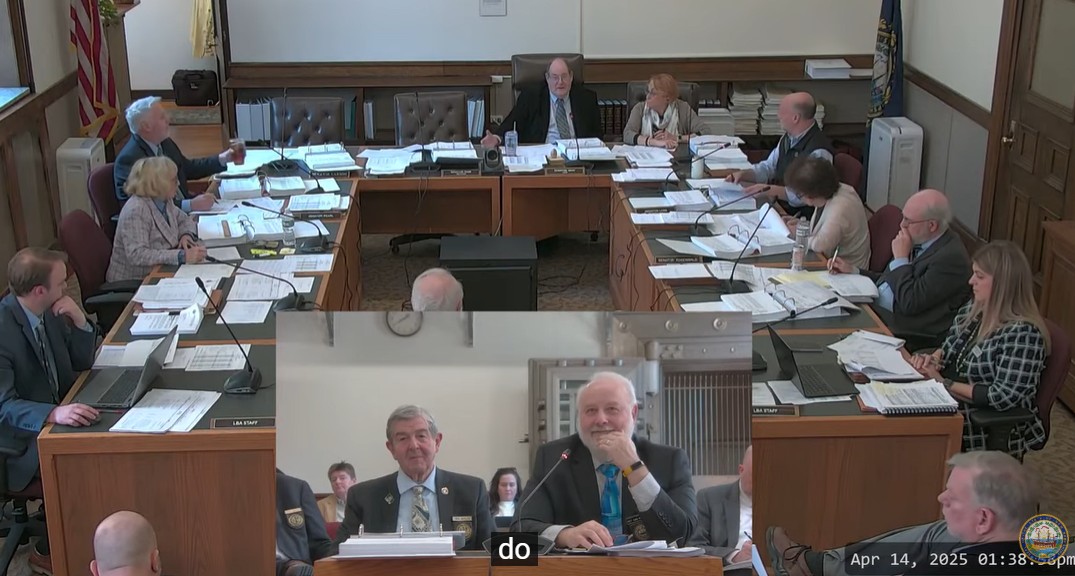By PAULA TRACY, InDepthNH.org
CONCORD – The Senate Finance Committee was given an overview of the House-passed biennial budget by the drafters of the document, some of whom gave advice on changes they would make if Senators find themselves with more projected revenue.
The meeting Monday between the committee and leaders of the House Finance Committee was the first step in what will be a process to find a way to pay for state programs and services in a tight financial situation.
State Rep. Ken Weyler, R-Kingston, chair of the House Finance Committee who has worked on 15 budgets, said it was “quite a challenge” given the fiscal picture of the state which is down compared to the past two years.
The committee found itself about eight weeks ago looking at an almost $800 million deficit between the governor’s budget proposal and the cash they could spend from new projected revenues.
New Hampshire is a balanced budget state so the House could only work with projected revenues that the House Ways and Means Committee brought them.
While March revenues have come in higher since the House crafted, the Senate will likely also be receiving more numbers during their process from April which is a heavy revenue month.
Regardless, it is still expected to be a tough time meeting the needs of the state.
“We’ve faced bigger challenges before,” Weyler said noting there was a benefit in the process because of the high number of vacant positions which were funded and the state’s ability to raise fees on everything from license plates to fishing licenses to fees from the Department of Environmental Services, which have not been raised in many years.
State Rep. Dan McGuire, R-Epsom, who is vice chair of the House Finance Committee, and headed up one of three divisions that worked on the budget also gave an overview.
He worked on budgets for most all departments except Health and Human Services.
He said revenue adjustments, increased fees, increased anticipated gambling revenue and the use of the state’s savings in its rainy day fund were some of the means used to come up with a budget.
The House budget includes layoffs to state employees where the governor’s budget does not.
Many of those are in the state prison system including social workers and cooks and support service staff rather than as guards.
McGuire said there are still 750 prison positions that are paid.
There are a lot of back of the budget cuts for various departments which means that they will allow the department to find the savings.
One big “deal” McGuire said was funding the Group II retirement benefits to the tune of $55 million for the biennium which stays for 10 years to benefit 1,500 first responders.
Both Democrats and Republicans have supported the measure.
Another big cost is a settlement fund for victims of the former Youth Development Center. The governor did not place any money in the budget for that while the House agreed to pay $10 million a year for the next two years, well short of the $75 million recommended.
“I have in my back pocket a way to get to that kind of number which we did not decide to do,” basically more gambling, McGuire said.
“If you want to go that route, I have an amendment,” he said.
Weyler said in the past the attorney general’s office has warned budget writers not to put too much in a settlement fund because it is a “big target,” for injury lawyers who want to make money.
He called it a “feeding frenzy,” for lawyers when the state agreed to a $160 million settlement fund and said they are advertising on television to get clients.
Victims are averaging a settlement of about $500,000. It is projected that there are 1,500 abuse cases with a July 1, 2025, deadline to file, McGuire said.
Rep. Jess Edwards, R-Auburn, said “I am not happy with this budget,” and he wished there were more resources.
He outlined Health and Human Services cuts which were of concern to his division.
State Sen. Cindy Rosenwald, D-Nashua, said she shared Edwards’ concern about the Medicaid provider rate decrease of 3 percent in the House budget.
Edwards said there would be a ripple effect which could do “more damage than we can foresee.”
He said the focus was on protecting those who the state has a direct obligation to; individuals who have no one else to help provide for their needs at places like the Glencliff Home for the Elderly and the NH Hospital were where the funds should go and he said more money should go to Glencliff for staff help.
He said if the Senate finds itself in a better financial situation he would look to also reinstate family planning services for Coos County saying that a clinic in Vermont is now closing and there are few alternatives and many people who financially cannot take care of themselves to get the medical help they need. That is different than in the southern part of the state, he said.
The House budget eliminates all state funding for family planning clinics.
Click the links below to tell your lawmakers what you think of various bills.
HOUSE
House meeting schedule for April – For schedule, click day, week or month
House Sign-in Form and Online Testimony Submission
View House Online Testimony Submissions
House Remote Sign In/Submit/View Testimony Directions (PDF)
Watch House committee meetings and sessions
SENATE
Senate meeting schedule for April For schedule, click day, week or month
Senate Remote Sign In
Senate Remote Sign In Directions (PDF)
Watch Senate committee meetings and sessions





